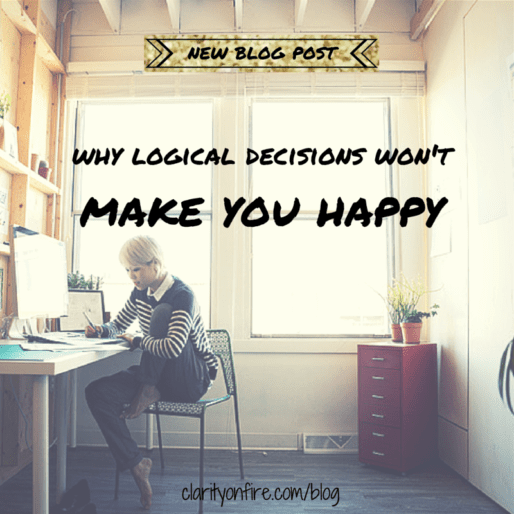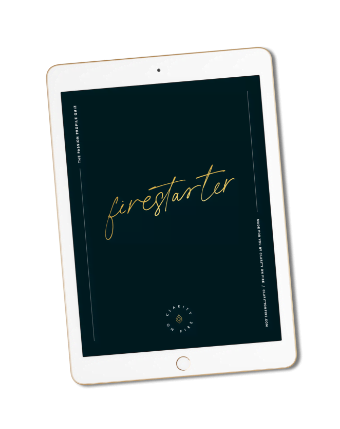I used to pride myself on being an extremely logical person.
To me, being a logical person meant being levelheaded, intelligent, practical, and inquisitive. And as a logical person, I obviously thought of myself as a really great decision-maker. It’s in my nature to always look at all sides of a situation, weigh the outcomes, ask a lot of questions, make the standard “pro/con” lists, and then make the decision that makes the most sense.
An inarguably smart approach, right? Or so I thought, at least …
REWIND A FEW YEARS
A few years ago, I decided to move to the DC area and get a new job for a year or two while starting a business.
Since this wasn’t meant to be my “dream career” (I was already 100% committed to entrepreneurship), my logical brain decided that the main things I needed from this job were money, flexibility, and maybe some good contacts to help me out in my future business.
So when I got a job offer that was willing to pay me more than I’d expected, with semi-flexible hours, and the chance to meet lots of new people on a regular basis, I obviously accepted.
I wasn’t feeling particularly excited about the job — in fact, I felt a strong gut feeling to turn it down and wait for something I would enjoy more — but it had everything I was looking for, and it would only be for a year or two. It made complete logical sense to take the job … so I did.
YEAHHHH … LOGIC DIDN’T FEEL GOOD
Once I got there, it became immediately clear why my gut feeling had so vehemently advised me against taking this job.
I had zero interest in the work I was doing (and the industry in general, for that matter). Frankly, it bored me before I stepped into the office on day one. I quickly found myself feeling trapped, drained, unengaged, and unproductive. I was miserable.
The worst part was, I hardly had enough energy at the end of the day to work on building my business, so progress took much longer than I’d expected.
From a logical viewpoint, I’d made a smart choice. But if we were using “happiness” as a scale instead … well, this turned out to be a pretty terrible decision.
It was around that time when I started to realize … hmm, maybe being super logical isn’t actually the best way to make big decisions about my life …
THERE’S A BETTER WAY TO MAKE DECISIONS
If I’d listened to my emotions and my intuition when deciding about this job, I would’ve turned it down in a heartbeat. But I was scared to follow my gut feeling! It felt irrational and irresponsible.
For most of us, making logical decisions feels safe — we can defend our rationale to anyone who questions us, and we usually have “proof” of why the decision is the best one.
But, as I’ve seen happen to tons of clients (and in my own life), the best “logical” decision is often NOT the one that’s going to make you happy, fulfilled, passionate, and lit up.
If you want a career, relationships, and life in general that’s inspiring and makes you incredibly happy and fulfilled, you simply can’t rely solely your logical brain. You MUST tap into your emotions and your intuition (or “gut feelings”).
![]() Logical decisions won’t make you happy. If you’re looking for fulfillment, you’ve gotta trust your gut.
Logical decisions won’t make you happy. If you’re looking for fulfillment, you’ve gotta trust your gut.
Easier said than done, right?
OK … SO HOW DO I DO THAT?
I was recently working with a client who was in a similar position — she knew it was time to quit her job and make a big career change, and she had a couple of options in front of her.
Immediately, she started going over the “pros and cons” (like so many of us tend to do), and I wasn’t feeling much emotion in her analysis. She was ticking off categories like salary, location, flexibility, leadership potential, etc., and comparing the two as though she were tallying score at a sports game.
I immediately stopped her thought process and asked if we could try something a little different.
I had her close her eyes and visualize, one at a time, what each job experience would feel like. I asked her questions like …
- You’ve just accepted the job. How do you feel right now?
- Fast-forward to 6 months into the job — what’s going on in your day-to-day life? Describe it for me.
- How do you feel when you wake up each morning in this situation?
- Where are you living? Who are the people in your life? How do you feel about your surroundings?
- How’s your energy level? How excited, motivated, and fulfilled do you feel by the work you’re doing?
- What’s missing from your life in this situation? What feels like it’s lacking?
- What regrets (if any) do you feel?
At the end of the visualization, I asked how she felt about the decision. Without hesitating, she said, “I know exactly what I want to do! It just feels right. And now I actually feel excited about my decision, instead of stressed out.”
LOGIC DOES HAVE ITS PLACE
Once my client had made her decision from a place of emotion and intuition, THEN we brought logic back into the equation to figure out logistics, negotiation strategies, etc.
I’m not asking you to ignore logic completely — we need it to make balanced choices. The best decisions are those that tap into our logical brain, our emotions, and our intuition. But if you rely completely on logic (like so many of us do), you’ll likely find yourself wondering later on, “I thought I made a good decision, so why does this feel so bad?”
Now, I want to hear from you! How many of your consider yourselves to be logical people? And how willing are you to try a new, more balanced way of making decisions? Leave a comment to let me know!
Much Love,
Kristen (+ Rachel)



Hi, how are you today? I hope all is well. I enjoyed reading your story. I’m still trying to find my passion in life. I recently graduated with my bachelor degree in general accounting. Have you ever read rich dad poor dad? I hope you enjoy the rest of your day.
Yes! I’m so guilty of doing this when in doubt. Usually it comes from a place of fear, and I don’t allow myself to let my emotions “get in the way”
My problem seems to be that while I know it will feel great to leave my awful job for the first few days, if I leave without securing another job, I’ll wind up just as miserable as I am now. It took a while for me to get this job and I hate it but I’m having no luck finding another one.
Hi Kristen,
What a great set of questions to ask when trying to make a career decision! I think you’re absolutely right, to make a logical decision means to only trust the thoughts produced by our ego and to ignore the inner intuition within our self.
I like how these questions tapped into emotion in a balanced way and would add that sometimes emotion can be as devastating to decision making as pure logic. I think some emotions like fear really debilitate people and keep them from making the choice that they would otherwise inherently know is right.
As you have stated thoughts and emotions are necessary considerations but I believe they are less significant than the divine intuition we all possess.
Kind regards,
TJ